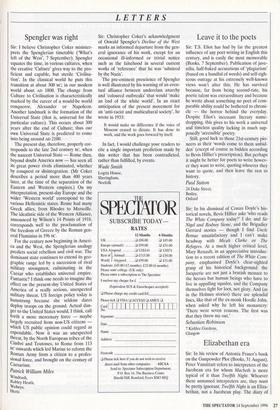LETTERS
Spengler was right
Sir: I believe Christopher Coker misinter- prets the Spenglerian timetable ('What's left of the West', 7 September). Spengler equates the time, in various cultures, when the creative 'Culture' gives way to the pro- ficient and capable, but sterile 'Civilisa- tion'. In the classical world he puts this transition at about 300 BC; in our modern world about AD 1800. The change from Culture to Civilisation is characteristically marked by the career of a would-be world conqueror, Alexander or Napoleon. Another landmark is the formation of the Universal State (that is, universal for the particular culture). This occurs about 300 years after the end of Culture; thus our own Universal State is predicted to come into being around AD 2100.
The present day, therefore, properly cor- responds to the late 2nd century BC, when the nascent Universal State — Rome then, beyond doubt America now — has seen all its great power rivals eliminated, whether by conquest or disintegration. (Mr Coker describes a period more than 400 years later, at the time of the separation of the Eastern and Western empires.) On my interpretation, present-day Europe and the wider 'Western world' correspond to the various Hellenistic states. Rome had many Greek allies, from Rhodes to Marseille. The idealistic side of the Western Alliance, announced by Wilson's 14 Points of 1918, corresponds well to the proclamation of the freedom of Greece by the Roman gen- eral Flaminius in 196 BC.
For the century now beginning in Ameri- ca and the West, the Spenglerian analogy predicts social rebellion and civil war. The dominant state continues to extend its geo- graphic range led by a succession of rival military strongmen, culminating in the Caesar who establishes universal empire. Fantastic? I think one needs to imagine the effect on the present-day United States of America of a really serious, unexpected military threat. US foreign policy today is hamstrung because she seldom dares deploy troops on the ground. Actual dan- ger to the United States would, I think, call forth a more mercenary force — maybe largely recruited from non-US citizens which US public opinion could regard as expendable. Now it was an unexpected threat, by the North European tribes of the Cimbri and Teutones, to Rome from 113 BC onwards which led Marius to reform the Roman Army from a citizen to a profes- sional force, and brought on the century of Caesarism.
Patrick William Miles
Windrush, Rabley Heath, Welwyn, Herts


































































 Previous page
Previous page